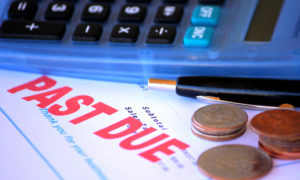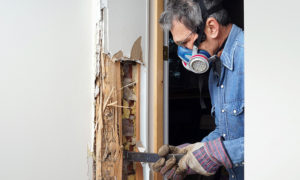Landlords and tenants don’t always have the best relationships. As you may know, there is a lot of room for disagreements and fights. Learn how to deal with the most common landlord tenant issues below.
How to Solve Common Landlord Tenant Problems
As a landlord, you are well aware of the many problems that come with your job. Dealing with tenants is not always easy, especially when you have bad tenants. Whether you are new to the landlord game or not, though, the most common tenant problems do come with effective solutions. Here are some of the most frequent landlord tenant issues and how to solve them.
1. Late or Non-Payment of Rent
 If you ask any landlord what their top tenant issues are, late rent payments or non-payment will usually take first place.
If you ask any landlord what their top tenant issues are, late rent payments or non-payment will usually take first place.
Tenants have various reasons for paying their rent late or not at all. It could stem from financial struggles, a dispute with the landlord, or just plain forgetfulness. As with a lot of problems, though, communication plays a key role in helping resolve this.
Make sure your tenant knows when rent is due and how much. If payments are consistently coming in later than usual, talk to your tenant and ask them what the problem is. You can try to help them out by negotiating a flexible payment plan. You can also prorate any applicable late fees.
If possible, allow your tenant to look for a roommate so that they have someone they can split the rent with. You can also move them to a different unit that costs less if you have any. Should the problem lie with the method of payment, try setting up more convenient ways to accept rent.
2. Security Deposit Use
This is a landlord tenant issue that is usually linked to the first one. Some tenants think that they can just use the security deposit to cover rent, but that is not what the security deposit is for. Again, communication is paramount here.
Make sure your tenant knows from the get-go that the security deposit can’t be used to cover rent, even if it is for the last month on the lease. Don’t forget to include these terms in your lease agreement. Even though many landlords withhold the security deposit for that purpose, it is important to keep in mind that the amount may not be enough. Factor in any damages you need to pay for, and you are looking at a loss.
Another option is to collect both the first month’s rent and the last month’s rent right from the beginning. Then, collect a separate amount to use as a security deposit. As with any of your terms, this should also be clearly written in your lease.
3. Noisy Tenants
 Noise complaints happen all the time and are one of the most common landlord problems.
Noise complaints happen all the time and are one of the most common landlord problems.
If your tenant complains about a noisy neighbor, the actions available to you depend on whether or not you are also the neighbor’s landlord. In case you are not their landlord, you can’t really do much except advise your tenant to talk to their neighbor directly. If you have another unit available, you can offer to move your tenant there instead.
If both parties are your tenants, it is still best to leave them to resolve their dispute on their own. Include a clause in your agreement that requires tenants to sort out their disagreements amongst themselves to the best of their abilities. If you must intervene, make sure your agreement reflects that tenants may not always like the resolution.
When getting involved, talk to the noisy tenant in a calm yet stern manner. Let them know that someone has complained about the noise and ask them to avoid making noise in the future. It is equally important that your lease agreement restricts the amount of noise allowed.
4. Maintenance Issues
First of all, you should make sure your lease agreement clearly defines who is responsible for what. Most of the time, though, maintenance falls under the landlord’s responsibilities. If your tenant complains about a maintenance issue you are responsible for, respond in a timely manner. Let them know you heard their complaint and when they can expect the problem to be fixed. Then, proceed to address the issue promptly.
5. Broken Appliances
If your contract says you are responsible for maintaining and repairing broken appliances, make sure to hold up your end of the agreement. Typically, the responsibility falls on your shoulders if the property already comes with appliances. Otherwise, though, you can always include a clause in your lease agreement stating that the tenant is responsible for repairing or replacing any appliances, even if they come with the unit.
But, that does not mean you should allow tenants to move into a unit with already-broken appliances. See to it that you inspect the property and its contents for any damages. If an appliance is broken, replace it before a new tenant moves in.
6. Rule Violations
Your lease agreement should include all the rules your tenant should follow. This includes any restrictions on noise, pets, subleasing, and the like. While there are certain tenants who adhere to the rules religiously, there are also bad renters who treat rules as optional rather than mandatory. Then again, there are also some good tenants who slip up every once in a while.
If your tenant has broken a rule, make sure to send them a written notification of the violation asking them to remedy the situation by a certain date. The notice should also include the penalty for failing to comply, such as eviction.
In some cases, there is room for negotiation. For instance, if you have a no-pets policy and a tenant brings home a dog, you can amend your lease to require an additional pet deposit. This deposit will cover any damages the tenant’s dog might cause.
7. Intentional Property Damage
 One of the most irritating rental problems you can face is intentional damage.
One of the most irritating rental problems you can face is intentional damage.
There are just some bad tenants out there who purposefully damage your property before they move out. Worse yet, they will feign innocence and claim that the damage was already there when they first moved in.
Avoiding this problem will require you to take action right from the start. Before a new tenant moves in, conduct an inspection of the property (with the tenant present). Take photos of the property’s condition and ask the tenant to sign them. Then, once the tenant moves out, conduct another inspection — again, documenting the condition of the property with pictures. Both move-in and move-out inspection photos should have time and date stamps, too.
Additionally, as a landlord, your property is an investment. Therefore, you must protect it by taking out a property insurance policy. Look for a policy that serves landlords specifically since regular homeowner’s insurance may not be enough. Also, make sure your policy has sufficient liability coverage. This will save you money in the long run.
8. Legal Disputes
Have you ever had a tenant bring up the law in the middle of an argument? What about a tenant who has threatened to file a lawsuit against you? Believe it or not, this type of thing happens a lot. But, not all landlords even know that they are violating the law until it is pointed out to them.
The best way to avoid legal troubles is to familiarize yourself with the law. This includes federal, state, and local laws that apply to landlords and tenants, such as the Landlord Tenant Law. Some landlords can’t be bothered to go through this time-consuming process, so they seek the help of a property management company instead.
9. High Turnovers
Many landlords wonder why their tenants never renew their leases. But, if you look closely at the state of your rental property, it is easy to see why. One of the top tenant issues that cause them to leave is maintenance and repair disputes. Tenants simply don’t like living in a poorly maintained, dilapidated unit. With tons of better options out there, they make the easy choice of packing up and moving out.
Thankfully, this problem comes with a simple solution — respond and address. When a tenant makes a maintenance or repair request, address it as soon as possible. And don’t make hasty repairs, too. Make sure the work done is of great quality so that tenants remain satisfied and don’t have to keep making the same requests.
Another way you can minimize your turnover rate is to make upgrades to your property. Give your tenants a comfortable space to live in and amenities that put you on the map.
Perhaps you need to update your landscaping or do some repainting. You should also make sure you are charging a competitive rate. Additionally, talk about the possibility of a lease renewal about 3 to 4 months in advance. You can even offer a discount, if possible, should they agree to renew.
10. Pest Infestations
 Pests are another one of the landlord issues that drive away tenants. Nobody wants to live in a property with rats and cockroaches for roommates.
Pests are another one of the landlord issues that drive away tenants. Nobody wants to live in a property with rats and cockroaches for roommates.
Pests come from anywhere — tenants can even bring them into the unit from the outside. Bedbugs, in particular, easily spread from unit to unit. The best way to address pests is to hire an exterminator at the first sight or mention of them. In doing so, you can prevent a full-blown infestation.
11. Unpaid Utilities
The responsibility of paying for utilities is another common point of contention among landlords and tenants. Your lease agreement should clearly define who shoulders this responsibility. Even if the utility bills are registered under your name, if your lease agreement states that the tenant pays for utilities, then the tenant should follow through.
This usually creates a problem, though, if your tenant moves out without notice. When that happens, since the utilities are under your name, then the company will ask you to pay for them. But, if the utilities are under your tenant’s name, then the company will track them down in an attempt to collect unpaid bills.
The Importance of Thorough Screening
Landlord tenant issues are often a source of frustration. The good news is you can avoid most of these problems with the help of a thorough tenant screening process. Bad tenants are usually the ones who pay rent late, violate rules, leave without paying for utilities, and make a lot of noise. A thorough screening process, though, will allow you to weed out the bad eggs.
Tenant screening, along with handling maintenance requests, collecting rent, and keeping up with the law, can be a difficult and time-consuming endeavor. Start looking for a property management company that can assist you with your landlord duties. Use our online directory in your search for the best one in your area!
RELATED ARTICLES:
- 5 Most Common Rental Lease Violations And How To Handle Them
- When Is It Right To Evict A Tenant?
- Avoiding Bad Tenants At All Cost




 Company
Company